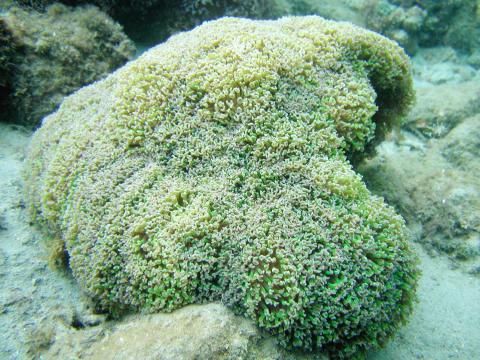Taiwanese and US marine biologists have solved a major scientific puzzle on the bioluminescent color changes seen during the life cycles of coral, and the findings might be used to find ways to protect human skin from damage by ultraviolet rays.
In a research collaboration between the National Museum of Marine Biology and Aquarium (NMMBA) and the Scripps Institute of Oceanography in San Diego, California, scientists found that coral fluorescence changes from green in larvae to cyan in adult colonies.
According to Fan Tung-yun (樊同雲), co-author of the research report, ultraviolet radiation is harmful to coral and leads to coral bleaching and can even kill reef colonies.

Photo courtesy of the National Museum of Marine Biology and Aquarium
Past studies determined that coral have fluorescent proteins in their cells, which absorb higher-energy light and emit fluorescent light in a lower energy field, but the changes in life development and its associated behavior had not yet been fully explained, Fan said.
For the collaboration, the museum harvested newborn stony coral larvae (Seriatopora hystrix) in waters off Kenting’s South Bay (南灣) and raised them in an aquarium.
The paper — titled Life History Changes in Coral Fluorescence and the Effects of Light Intensity on Larval Physiology and Settlement in Seriatopora hystrix — was co-authored by Fan and US counterparts, M.S. Roth and Dimitri Deheyn.
The scientists subjected newborn larvae, growing larvae and adult polyps to varying wavelengths of light radiation, including ultraviolet, blue and cyan-colored lights.
Results indicated that the change in fluorescence from green in larvae to cyan in adult colonies can be attributed to physiological traits, and the fluorescent protein is affected by environmental conditions, heat stress, as well as differences in light levels and wavelengths.
“The fluorescent proteins have a varying protective effect during the coral’s life cycle. It is likely correlated with the fact that planktonic larvae float near the ocean’s surface [and are more exposed to sunlight] while adult polyps are anchored on the seafloor at some depth [and are thus more protected],” Fan said.
“Our discovery might benefit research into the protection of human skin from ultraviolet radiation. Scientists may be able to develop new types of sun screens or protective suits to guard against solar radiation and offer people greater protection,” he added.

Alain Robert, known as the "French Spider-Man," praised Alex Honnold as exceptionally well-prepared after the US climber completed a free solo ascent of Taipei 101 yesterday. Robert said Honnold's ascent of the 508m-tall skyscraper in just more than one-and-a-half hours without using safety ropes or equipment was a remarkable achievement. "This is my life," he said in an interview conducted in French, adding that he liked the feeling of being "on the edge of danger." The 63-year-old Frenchman climbed Taipei 101 using ropes in December 2004, taking about four hours to reach the top. On a one-to-10 scale of difficulty, Robert said Taipei 101

Taiwanese and US defense groups are collaborating to introduce deployable, semi-autonomous manufacturing systems for drones and components in a boost to the nation’s supply chain resilience. Taiwan’s G-Tech Optroelectronics Corp subsidiary GTOC and the US’ Aerkomm Inc on Friday announced an agreement with fellow US-based Firestorm Lab to adopt the latter’s xCell, a technology featuring 3D printers fitted in 6.1m container units. The systems enable aerial platforms and parts to be produced in high volumes from dispersed nodes capable of rapid redeployment, to minimize the risk of enemy strikes and to meet field requirements, they said. Firestorm chief technology officer Ian Muceus said

MORE FALL: An investigation into one of Xi’s key cronies, part of a broader ‘anti-corruption’ drive, indicates that he might have a deep distrust in the military, an expert said China’s latest military purge underscores systemic risks in its shift from collective leadership to sole rule under Chinese President Xi Jinping (習近平), and could disrupt its chain of command and military capabilities, a national security official said yesterday. If decisionmaking within the Chinese Communist Party has become “irrational” under one-man rule, the Taiwan Strait and the regional situation must be approached with extreme caution, given unforeseen risks, they added. The anonymous official made the remarks as China’s Central Military Commission Vice Chairman Zhang Youxia (張又俠) and Joint Staff Department Chief of Staff Liu Zhenli (劉振立) were reportedly being investigated for suspected “serious

Nipah virus infection is to be officially listed as a category 5 notifiable infectious disease in Taiwan in March, while clinical treatment guidelines are being formulated, the Centers for Disease Control (CDC) said yesterday. With Nipah infections being reported in other countries and considering its relatively high fatality rate, the centers on Jan. 16 announced that it would be listed as a notifiable infectious disease to bolster the nation’s systematic early warning system and increase public awareness, the CDC said. Bangladesh reported four fatal cases last year in separate districts, with three linked to raw date palm sap consumption, CDC Epidemic Intelligence